Interest in AI technology and, more specifically, OpenAI’s ChatGPT product has skyrocketed in recent weeks.
People are looking for information about both topics.

Thousands are writing about ChatGPT across the web…

…and talking about it in various communities.
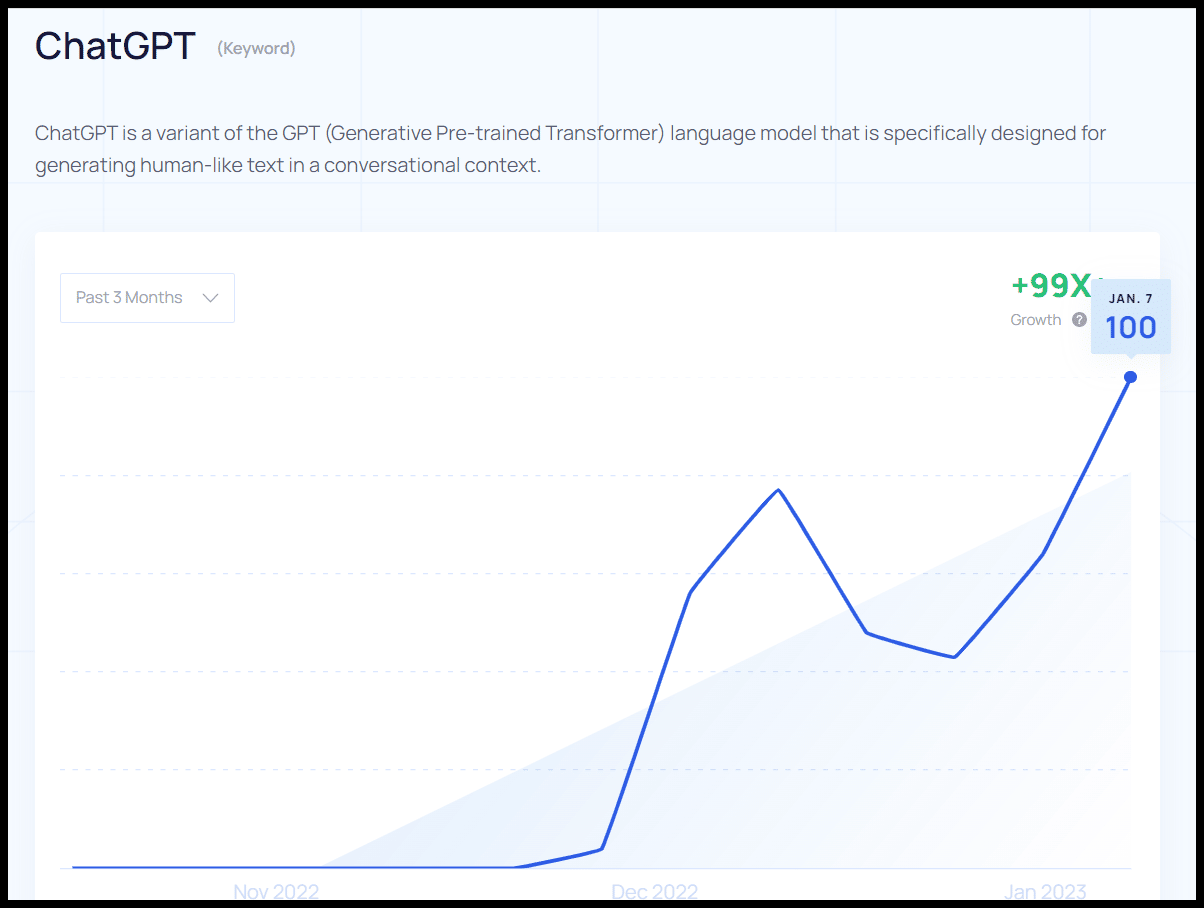
And as you can tell from the graphs, all of this happened quickly.
Whether your Twitter and LinkedIn feeds have been inundated with threads and posts about ChatGPT (like mine) or you’re just stumbling on the topic, you may want answers to two questions before investing your time and energy into learning ChatGPT:
- Is ChatGPT specifically likely to be an enduring product?
- What does it actually do and what can you personally use it for?
In this article, I’ll help you answer these questions by telling you:
- What ChatGPT is.
- How it works.
- Who built it and is currently behind the technology.
- Why it’s important for SEOs specifically.
- Some of the current and likely future uses for it.
What is ChatGPT?
ChatGPT is an AI-powered chatbot created by OpenAI that can be accessed at https://chat.openai.com/.

As of this writing, ChatGPT offers a free version of the tool that users can access, but there have been indications that they will be charging $42/month for a pro version. OpenAI has also indicated that they’ll make an API for the tool available soon.
The interface is simple, with an empty dialog to enter a prompt. The tool can perform various tasks and return text in response. Some examples of tasks ChatGPT can execute include:
- Answering questions.
- Writing things like ads, emails, paragraphs, whole blog posts, or even college papers.
- Writing, commenting or marking up code.
- Changing the formatting on a block of text for you.
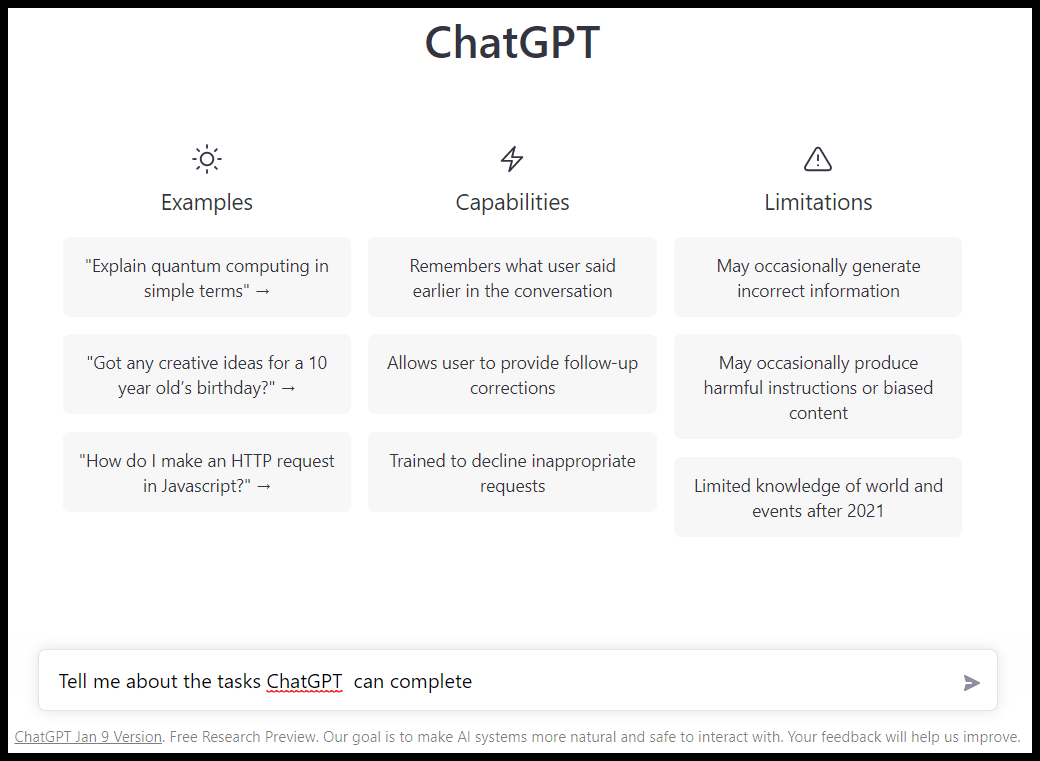
ChatGPT launched in late November 2022, on the heels of AI Content Generator Jasper.ai receiving $125 million in funding at a $1.5 billion valuation earlier the same month. The tool reached a million users in less than a week.
But each session has a specific cost associated with it:
In the interest of helping fund those costs (and further growth) Microsoft invested $10 billion in OpenAI at a $29 billion valuation. A move which, combined with ChatGPT’s growth and word of mouth, might be fueling Google’s reported concerns about ChatGPT as a possible threat.
OpenAI has also indicated that there will be a “professional” version of the tool and Greg Brockman the President & Co-Founder of OpenAI shared a link to a Google Form to get on the waitlist:
Some users have reported seeing an option to upgrade to a $42 free version when logged into their account.
Even with the Microsoft investment, ChatGPT has continued to experience outages and even had to limit new users on the platform:

And ChatGPT is starting to face criticisms over the accuracy of some of the output of the tool, while also staring down competition from rivals (which one would have to assume will only increase and intensify in the wake of the platform’s early success).
Now that you know what ChatGPT is, it’s also helpful to understand a bit more about how it works and who built it (and what their goals and motivations may be).
How does it work and how was it trained?
If you’re an SEO looking for ways to leverage AI in your everyday work, you don’t need to know how to build your own chatbot.
That said, when using tools like ChatGPT, you will want to know where the information it generates comes from, how it determines what to return as an answer, and how that might change over time.
That way you can understand what level of trust to put in the output of ChatGPT chats, how to better craft your prompts, and what tasks you may want to use it for (or not use it for).
Before you start to use ChatGPT for anything, I’d strongly recommend you check out OpenAI’s own blog post about ChatGPT. There they have a nice graphic explaining how it works, along with a more in-depth explanation.
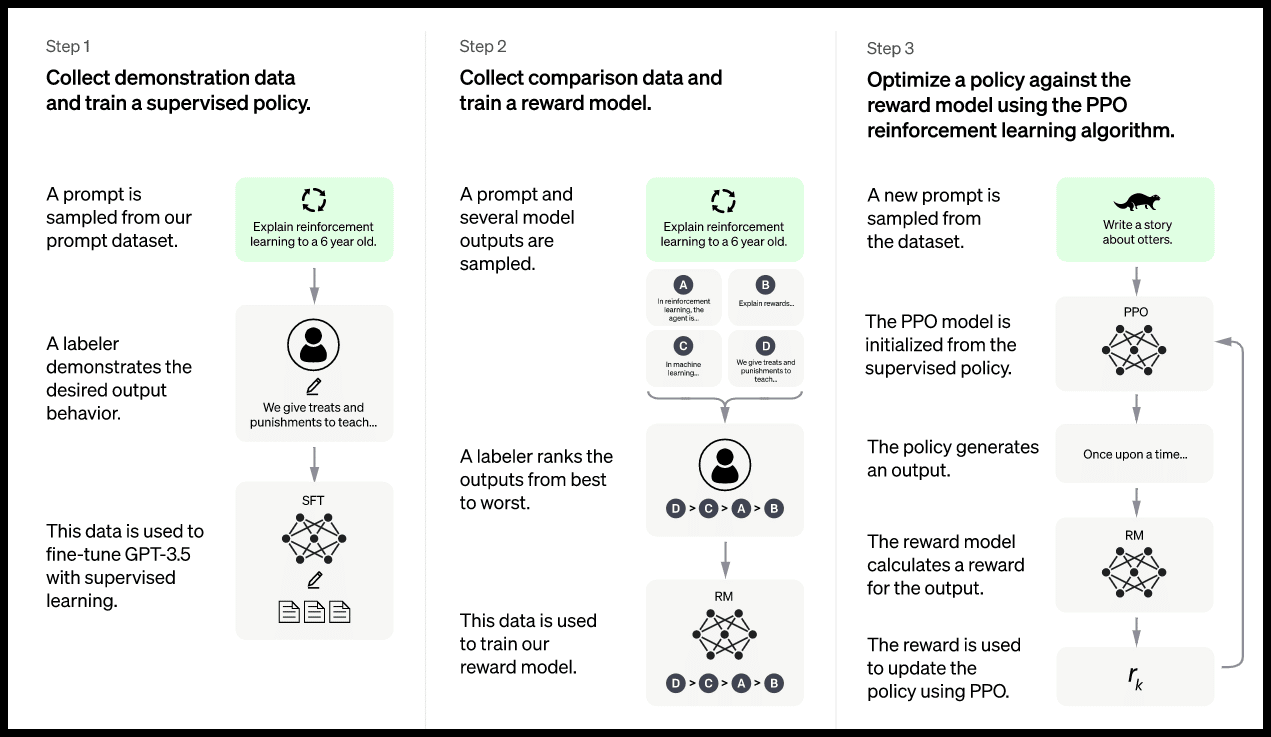
AssemblyAI also has a detailed third-party breakdown of how ChatGPT works, some of its strengths and weaknesses, and a number of additional sources if you’re looking to dive deeper.
One of the most important things to remember about how ChatGPT works is its limitations. In OpenAI’s own words:
“ChatGPT sometimes writes plausible-sounding but incorrect or nonsensical answers. Fixing this issue is challenging, as: (1) during RL training, there’s currently no source of truth; (2) training the model to be more cautious causes it to decline questions that it can answer correctly; and (3) supervised training misleads the model because the ideal answer depends on what the model knows, rather than what the human demonstrator knows.”
Another that’s important to highlight:
“While we’ve made efforts to make the model refuse inappropriate requests, it will sometimes respond to harmful instructions or exhibit biased behavior. We’re using the Moderation API to warn or block certain types of unsafe content, but we expect it to have some false negatives and positives for now. We’re eager to collect user feedback to aid our ongoing work to improve this system.”
As many people know, the ChatGPT was fine-tuned on a GPT model which finished training in early 2022 – meaning it won’t have knowledge of more current events.
It is also trained on a “vast amount” of text from the web, so of course answers can be incorrect. From ChatGPT's own FAQs:
"Can I trust that the AI is telling me the truth?
ChatGPT is not connected to the internet, and it can occasionally produce incorrect answers. It has limited knowledge of the world and events after 2021 and may also occasionally produce harmful instructions or biased content.
We'd recommend checking whether responses from the model are accurate or not. If you find an answer is incorrect, please provide that feedback by using the "Thumbs Down" button."
Who built ChatGPT?
Similarly, understanding who built the application and why is an important background if you hope to use it in your day-to-day work.
Again, ChatGPT is an OpenAI product. Here's some background on the company and their stated goals:
- OpenAI has a non-profit parent organization (OpenAI Inc.) and a for-profit corporation called OpenAI LP (which has a “capped profit” model with a 100x profit cap, at which point the rest of the money flows up to the non-profit entity).
- The biggest investor is Microsoft. OpenAI employees also own equity.
- Former Y Combinator President Sam Altman is the CEO of OpenAI and was one of the original founders (along with prominent Silicon Valley personalities such as Elon Musk, Jessica Livingston, Reid Hoffman, Peter Thiel, and others). Many people ask about Musk’s involvement in the company and ChatGPT. He stepped down as a board member in 2018 and wouldn’t have had any meaningful involvement in the development of ChatGPT (which obviously didn’t launch until November 2022).
Notable elements here if you’re interested in ChatGPT either as an SEO or as a viable alternative to Google are obviously:
- Microsoft’s involvement (with Microsoft Bing being the number 2 search engine – a distant second behind Google).
- ChatGPT obviously isn’t designed to specifically be either an SEO or a content tool (unlike tools like Jasper.ai, Copy.ai and other competitors – many of which are built on top of the GPT-3 framework).
Why should SEOs care about ChatGPT?
While it’s possible that ChatGPT or another AI-powered chatbot could become a viable alternative to Google and traditional search, that’s likely at least far enough away that most SEOs won’t be primarily concerned with the tool for that reason. So why should SEOs care?
ChatGPT has a variety of functionality that can be helpful for SEOs. Additionally, given the platform’s ability to generate AI content, it’s important to understand both what the tool is capable of on that front, and how Google talks and thinks about AI content generally.
What follows are ChatGPT's use cases for SEO.
AI content generation
By far the “buzziest” early 2023 SEO topic has been AI content broadly, and ChatGPT has been at the center of that discussion since it launched.
From creating blog posts whole cloth to selecting images, generating meta descriptions or rewriting content, there are a number of specific functions ChatGPT can serve when it comes to content creation generally and SEO-focused content creation specifically.

But, of course, an important concern here is how Google thinks about AI content in general.
SEOs need to identify the specific instances where ChatGPT can make them more efficient or enhance their content. At the same time, it's crucial to understand the potential risks to rankings and organic traffic when using ChatGPT-generated content in different ways (particularly if you’re relying on content created by writers you don’t have a relationship with).
Keyword research and organization
Similarly, there are a number of specific tasks ChatGPT can execute related to keyword research and optimization, such as:
- Suggestions for keywords to target or blog topics.
- Keyword clustering or categorization.

A key consideration for SEOs is how this relates to your current and optimal processes for these tasks.
ChatGPT isn’t designed to be an “SEO tool,” so won’t have the emphasis on search volume, competition, or relevance and co-occurrence that more focused keyword research or organization tools will.
Code generation and technical SEO
ChatGPT is helping people generate code and build things, and it’s no different for specific technical SEO tasks.
Depending on the prompts, ChatGPT can help with things like schema markups, robots.txt directives, redirect codes, and building widgets and free tools to promote via link outreach, among others.
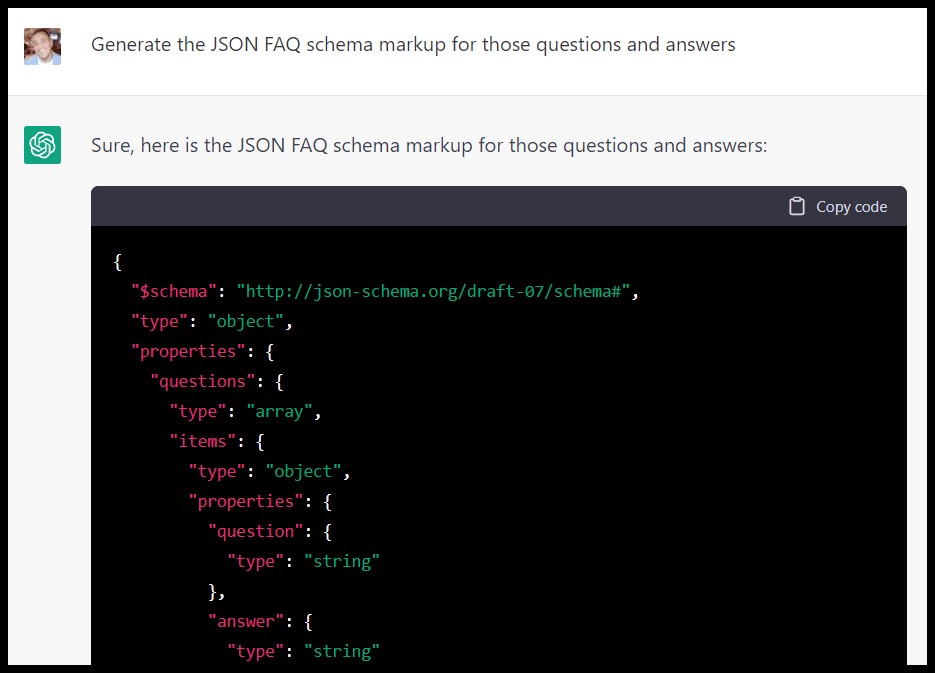
As with any type of content creation, you must QA the code that ChatGPT generates. Your site’s template, hosting environment, CMS, and more can break if the code ChatGPT generates is incorrect.
Link building
ChatGPT can generate lists of outreach targets, emails, free tool ideas, and more that may assist with link building work.
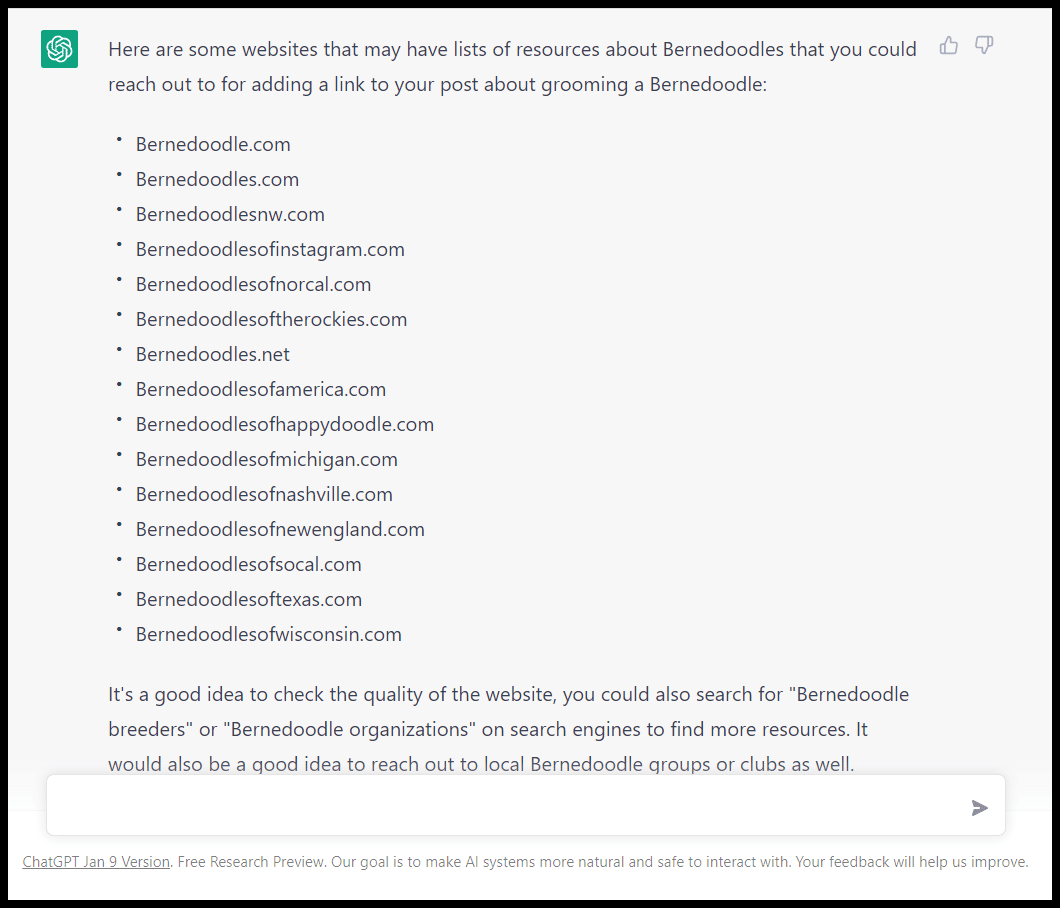
Here again (you may be sensing a theme) two things to keep in mind:
- Since ChatGPT was not built to be a link building tool, it may not prioritize opportunities or generate ideas that will specifically help with SEO success.
- GPT-3 is trained on old data, so the information you’re getting may be wrong or outdated.
How to think about ChatGPT as an SEO
Ultimately, given its early functionality and reception along with OpenAI’s founding team and investors (and level of investment), ChatGPT is likely to have longevity as a tool.
It’s highly useful, with a high potential for getting folks who misuse it into trouble.
I would encourage SEOs to become familiar with ChatGPT (and tools like it) and get used to carefully checking its output.
The post What is ChatGPT and why SEOs should care appeared first on Search Engine Land.
No comments:
Post a Comment